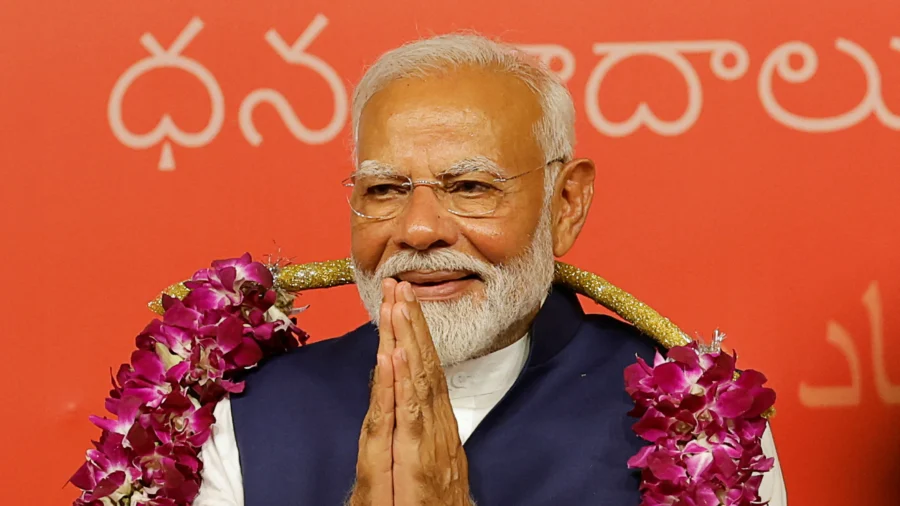NEW DELHI—No single political party is heading toward an absolute majority in India’s national elections, but preliminary results show a victory for incumbent Prime Minister Narendra Modi, although without the overwhelming mandate Mr. Modi had predicted.
Vote counting started on Tuesday morning, with final results still to be announced. However, the National Democratic Alliance (NDA), led by incumbent Prime Minister Narendra Modi, will likely form the next government. The NDA, a political alliance led by Mr. Modi’s Bhartiya Janta Party (BJP) leads in 295 out of 543 seats in the 18th Lok Sabha—lower house of the Indian Parliament.
The BJP emerged as the single largest winner, claiming leads and victories in 240 seats, while the Indian National Congress (INC) placed second at nearly 100 victories and leads. The INC heads the INDIA alliance (Indian National Developmental Inclusive Alliance) which is leading in 233 seats.
To form a government, an Indian political party or alliance needs a simple majority of 50 percent, which is 272 seats in the upcoming parliament. In the last elections, in 2019, the BJP won 224 out of 303 seats, with more than 50 percent of the total national vote share.
After the BJP failed to repeat this performance in 2024, the INDIA alliance targeted Mr. Modi—who has been India’s Prime Minister since 2014—asking him to take responsibility for his party’s performance and resign.
In a social media post, INC general secretary Jairam Ramesh said Mr. Modi should take “moral responsibility” for the BJP’s loss of seats and resign.
However in a speech delivered at BJP headquaters in the national capital on Tuesday evening in India, Mr. Modi thanked the Indian public for voting the NDA back to power for a third term.
“I am indebted to the people of the country for their blessings. The NDA government for the third time is certain. The people of the country have reposed their faith in the BJP and NDA. This is a victory of the biggest democracy of the world,” he said in his address, broadcast live on his website.
Since the nature of a majority in the Indian parliament determines the strength and stability of the government and heavily impacts its policy making, The Epoch Times reached out to global India experts to discuss how the 2024 poll verdict will affect India’s global standing and its foreign policy.
According to the analysts, the verdict, while mixed, demonstrates the resilience of Indian democracy, and is not an issue of policy concerns. They expressed the opinion that Mr. Modi’s influence as a global leader will continue, and predicted that India’s foreign policy should remain consistent despite the verdict.
Aparna Pande, a Research Fellow and the Director of Initiative on the Future of India and South Asia at the Washington-based Hudson Institute, told The Epoch Times in a written message that Prime Minister Modi’s brand will remain intact even if his party has secured a lesser majority.
“It is still no small feat to win 3 consecutive elections,” said Ms. Pande. “The recent elections in the world’s largest democracy show that, despite what many around the world have been saying, Indian democracy is robust and deeply grounded within India.”
Despite the setbacks, Mr. Modi’s third term as the Prime Minister is historic in Indian politics. The last time a similar feat occurred was six decades ago, when INC came to power for the third time in 1962.
Before the elections, when Mr. Modi was aiming for a super majority of more than 400 seats, his critics and the opposition alleged that his intentions were a threat to Indian democracy and that he would use his sweeping powers to change the country’s constitution.
Dr. Kaush Arha is the president of the Free and Open Indo-Pacific Forum. He is a senior fellow at the Institute for Tech Diplomacy at Purdue and at the Atlantic Council. Mr. Arha dismissed the concerns as an overstatement.
“Demise of Indian democracy is greatly exaggerated. People have spoken,” he told The Epoch Times in a written message.
“Strong opposition makes for strong democracy. Hope next Indian government is strong and inclusive to continue to play a leadership role on the world stage,” he said.
In his victory speech, Mr. Modi said that his third tenure as India’s Prime Minister will bring big decisions.
“I want to tell the people of the country that if you work for 10 hours, Modi will work for 18 hours. The country will write a new chapter of big decisions. This is Modi’s guarantee,” he said.
Ms. Pande expressed the opinion that India’s foreign policy has showed remarkable consistency, irrespective of political party, ideology or leader, and said she expects it to continue as before.
“The NDA coalition’s foreign policy will remain the same, with little change,” she said.
Vice Admiral (Rtd.) Shekhar Sinha, the Chairman of the Trustee Board of India Foundation and the former chief of India’s Integrated Defence Staff, told The Epoch Times that foreign policies are institutional decisions and don’t change with a change in political parties.
India’s stand on its disputed border issues with its two neighbors—Pakistan and China—will also remain the same, he said.
“The governance has not changed. The broad directives may vary a little bit. But the fact that the BJP is the leading partner in this coalition, my belief is that these two policies are likely to remain the same,” said Mr. Sinha.
From The Epoch Times

